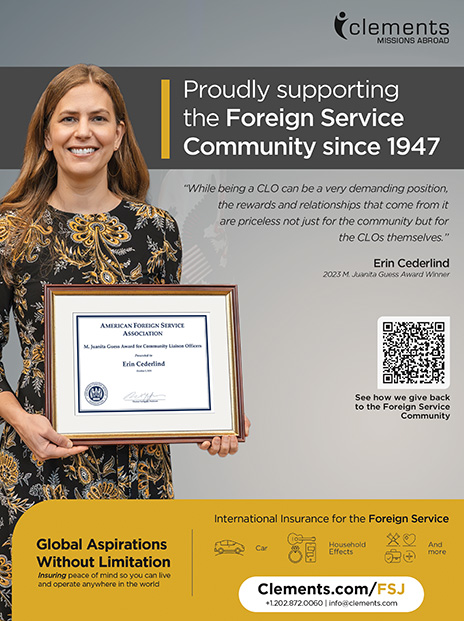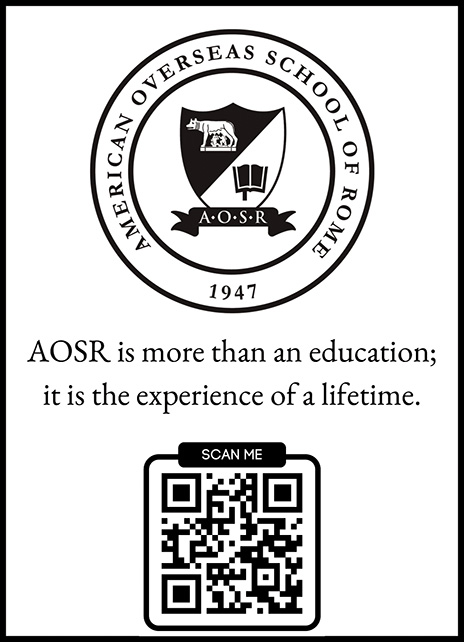2023 Awards for Exemplary Performance
Nelson B. Delavan Award for an Office Management Specialist
Katie Leis: Skillfully Managing VIP Visits and Embassy Events
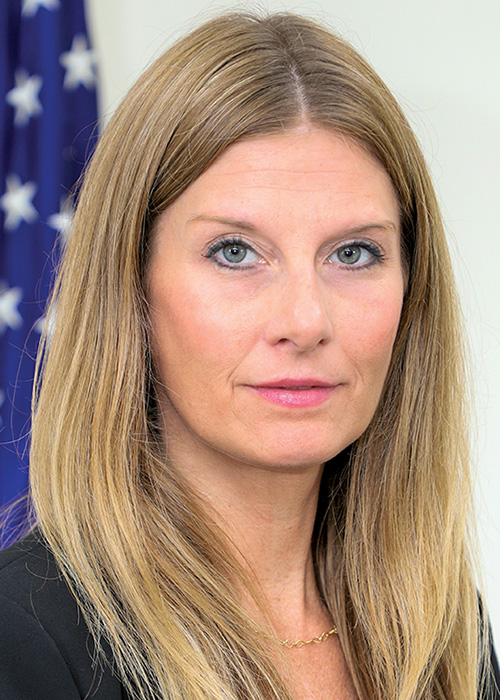
Katie Leis.
Katie Leis arrived in Phnom Penh in August 2021 to begin her assignment as the Regional Security Office (RSO) office management specialist (OMS) and immediately became an indispensable team member, strengthening embassy security services, furthering broader mission goals, and illustrating her commitment to department core values as she helped manage numerous high-level visits.
As the site lead for the 40th ASEAN Summit, held in Cambodia in 2022, Leis collaborated with the White House and Secret Service to coordinate security and protocol needs, access, press coverage, and staffing for five meetings with other heads of state. Leveraging her local contacts, she also quickly coordinated a bilateral meeting and unscheduled meet-and-greet for President Joe Biden with ASEAN ambassadors. On the morning of the most important event, the East Asia Summit, Leis coordinated with her local contacts and other participating delegations to move President Biden’s seat after she discovered that the approved seating chart had been changed the night before.
“During the president’s visit, I was able to see our highest level of diplomacy in action, as well as see how much work goes into preparing for it,” said Leis. “It took a massive team to make the visit a success, and I was proud to be a part of it.”
As the control officer for a congressional (CODEL) visit to Siem Reap, Leis used her cultural expertise to negotiate with airport leadership for vehicle access to the tarmac. This allowed the CODEL to attend all planned meetings and showcase the importance of U.S. regional partnerships in Cambodia. Leis was also the control officer for the ambassador’s visit to Siem Reap to participate in the Cambodia Climate Change Summit and to visit U.S.-supported programs focusing on youth development and food security.
With just one day’s notice, Leis visited each site and worked across the mission and with local partners to coordinate security, protocol, and public messaging to ensure a safe and successful visit. Advancing people-to-people ties, she also helped organize a town hall for more than 200 high school students, where the ambassador highlighted the importance of U.S.-ASEAN relations. Leis was later recognized by the assistant secretary for the Bureau of East Asian and Pacific Affairs for drafting a “cable of note” highlighting the visit.
During the president’s visit, I was able to see our highest level of diplomacy in action, as well as see how much work goes into preparing for it. It took a massive team to make the visit a success, and I was proud to be a part of it.
–Katie Leis
Leis frequently volunteered for work that was outside her job requirements. “During my second tour, I wanted to learn as much as I could about how diplomacy and sections and agencies throughout the embassy work,” she explained. “I also wanted to work with as many mission colleagues as possible, so I volunteered to take on roles outside my normal duties in the Regional Security Office.”
After COVID-19 restrictions were lifted, one of the U.S. ambassador’s priorities was to have a large Independence Day reception. Leis volunteered to be the event coordinator, establishing a planning committee comprising both American and local staff to elicit input and support for the 450-person reception. She collaborated with the front office to ensure its expectations were met, delegated tasks to the committee, managed a large budget, coordinated closely with venue management, and kept the planning team on schedule. She then established templates and clear guidelines to improve efficiency and reduce redundancies in future years.
Leis also volunteered to work with a colleague from USAID to develop the mission’s Integrated Country Strategy (ICS). Coordinating across all embassy sections and with 11 mission agency heads, planning started with a senior staff retreat and continued with a series of brainstorming and drafting sessions that were led by Leis and her co-coordinator. She worked closely with the ICS team in Washington, D.C., to ensure all guidelines were followed and potential areas of friction were avoided. Over the course of four months, Leis led the mission team to create a sustainable three-year strategic plan; she then presented the implementation strategy to nearly 100 American staff.
“I am honored to receive this award from AFSA and to showcase some of the amazing work that OMSs do every day!” Leis told the FSJ. “The events and projects that led to this award were group efforts, and as such, this award also reflects the hard work of my many talented colleagues in Phnom Penh. They helped me shine!”
Katie Leis joined the Foreign Service as an office management specialist in 2019, serving first in Accra and then in Phnom Penh. Earlier, she worked as a Peace Corps volunteer in Zambia, where she taught English and health studies, helped her community build a library, and started a support and income-generating group for adults living with HIV/AIDS. She also worked at Peace Corps headquarters in Washington, D.C., as a small grants specialist. Prior to joining the Peace Corps, Leis worked as an eligible family member at the U.S. embassies in Kabul and Tel Aviv. She holds a B.A. in sociology from Portland State University and an M.A. in international development from American University. Her hobbies include scuba diving, running, traveling, and volunteering to teach English and art to kids.
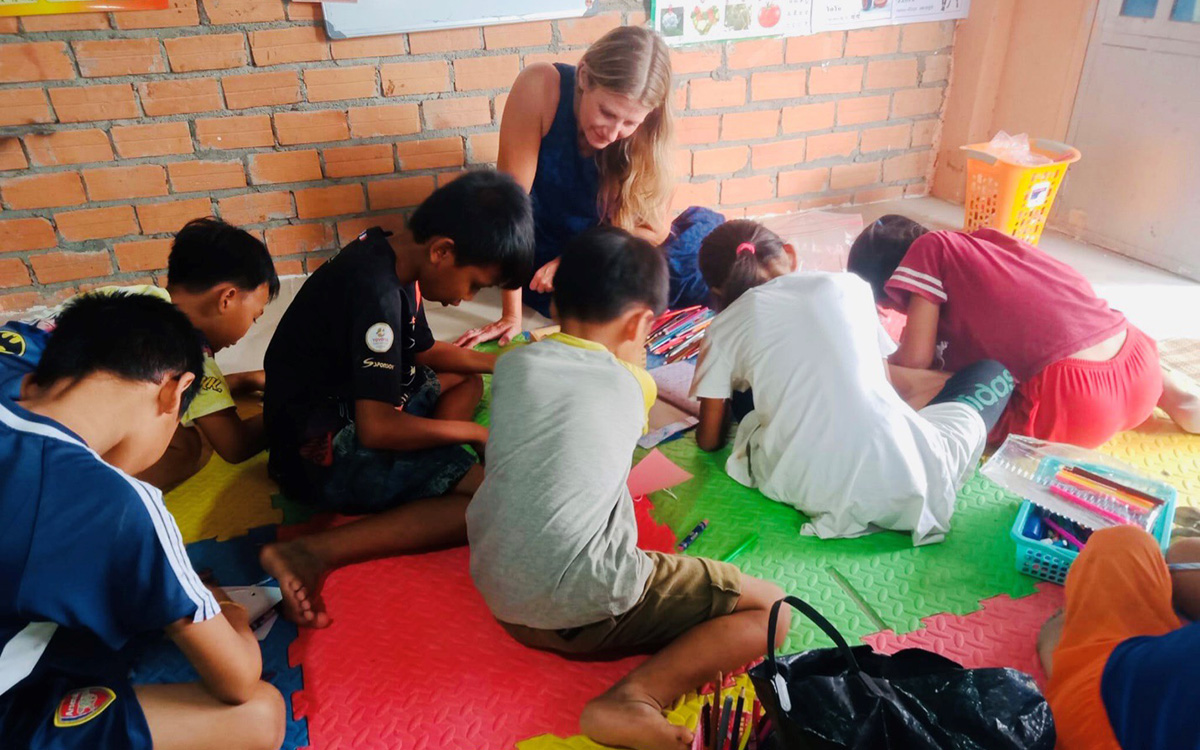
Katie Leis teaching art as a volunteer in Cambodia.
Mark Palmer Award for the Advancement of Democracy
Marina Grayson: Fighting Corruption and Russian Influence in Bulgaria
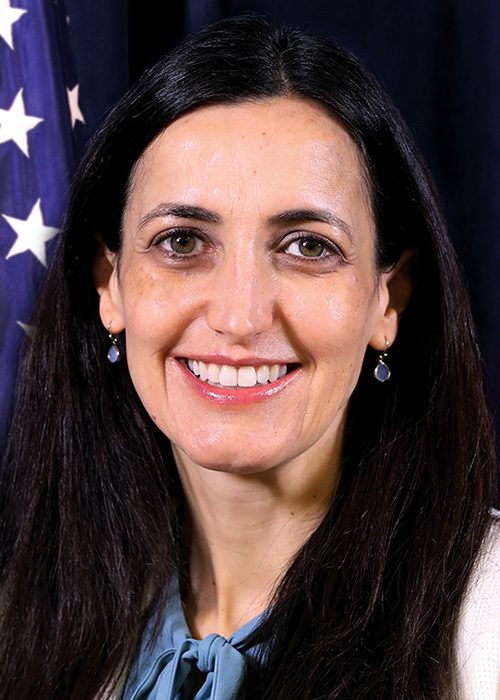
Marina Grayson.
Located on NATO’s eastern flank and characterized by deep historical ties to Russia, Bulgaria sits on the front lines of U.S. efforts to counter Russia’s destructive influence in eastern Europe. Bulgarians annually rank their country worst among European Union members in perceptions of corruption, and corruption is one of Moscow’s primary weapons to influence government decisions, control important sectors of the economy, and weaken Bulgaria’s ties with its trans-Atlantic allies.
Marina Grayson’s outstanding performance significantly advanced U.S. work to fight corruption and counter malign Russian influence. She led U.S. Embassy Sofia’s efforts to support Bulgaria’s fight against corruption by engaging senior government officials, legislators, civil society members, and local leaders to advocate for judicial reform, the implementation of anti-corruption policies, and the imposition of sanctions on individuals involved in corruption.
A top U.S. objective in the campaign to strengthen the rule of law in Bulgaria was passage of 11 pieces of judicial reform legislation. Grayson developed a strategy to advocate for the adoption of these bills during the three-month life of Bulgaria’s 48th parliament, identifying the three highest-priority bills and the key stakeholders to engage. During that period, Grayson led the embassy’s gradually escalating outreach to members of parliament, chairpersons of relevant parliamentary committees, and leaders of the most powerful parties, urging them to pass the legislation.
Resistance was stiff, but by orchestrating a campaign of intense targeted pressure behind closed doors in tandem with a public diplomacy campaign making the case for reform, Grayson helped achieve the passage of four bills, including protections for whistleblowers, before parliament was dissolved ahead of new elections.
The success of anti-corruption efforts in Bulgaria rests, in part, on ensuring that this issue is not perceived as a U.S. priority imposed on the country but as an example of the trans-Atlantic community supporting Bulgarians in reforming their own society. Given the economic costs of corruption, the business community was a natural partner in the campaign. Grayson worked closely with the American Chamber of Commerce in Bulgaria to develop a conference on the rule of law, bringing together representatives from several other chambers of commerce and nearly half a dozen European embassies in a groundbreaking demonstration of broad international support for the economic necessity of these reforms. This event was a pivotal point in the campaign to pass judicial reform legislation.
Recognizing that corruption also needs to be addressed at the local level, Grayson arranged the embassy’s participation in events with Bulgaria’s mayors, 10 of whom signed anticorruption pledges and worked with the International Republican Institute to bring actionable plans to promote transparency back to their municipal councils. She also planned a meeting that included mayors from Bulgaria’s Black Sea coast, where Russian influence is particularly strong.
I do believe that our efforts to shine a light on corruption and push the government to do better are having a real impact on the ground.
–Marina Grayson
While securing passage of four bills was an important achievement, parliament failed to pass several other important bills before it was dissolved. Anticipating this outcome, Grayson spent months working with colleagues in the State and Treasury departments to prepare a package of sanctions under the Global Magnitsky Act. Crucially, she also coordinated with the United Kingdom to jointly announce sanctions under its equivalent authority. As a result, exactly one week after parliament dissolved without passing all the necessary judicial reform legislation, the United States and United Kingdom announced sanctions on several high-profile individuals widely recognized as having been involved in corruption. The announcement met with near-universal approval, and almost all political parties immediately pledged their support for passing the remaining elements of judicial reform legislation as soon as the next parliament convenes.
“This was a whole-of-mission effort, with tremendous support from top embassy and Washington leadership as well as staff across multiple agencies, including dedicated local staff who had pushed for decades for these reforms,” said Grayson. “Improving corruption is a long-term generational process, so I have no illusions that passing legislation will by itself solve Bulgaria’s rule-of-law problems. But I do believe that our efforts to shine a light on corruption and push the government to do better are having a real impact on the ground.”
Grayson served as a political-economic officer in Sofia from 2020 to 2023. She previously served in Tegucigalpa, Santo Domingo, and as the Armenia desk officer in Washington, D.C. Before joining the State Department Foreign Service, Grayson worked as a lawyer in private and public practice, focusing on international arbitration and civil litigation. On a fellowship from 2008 to 2009, she worked at Human Rights Watch and the U.N. High Commissioner for Refugees in Moscow.
Marina Grayson received a B.A. in government from the University of Texas at Austin, a J.D. from New York University, and a master’s degree in public administration from Princeton University’s School of Public and International Affairs. Born in Kyiv, she came to the United States as a refugee with her family, settling in San Antonio, Texas. She travels the world with her husband, Matthew, and their three children.
Mark Palmer Award for the Advancement of Democracy
David Burnstein: Standing Up for Human Rights in Russia
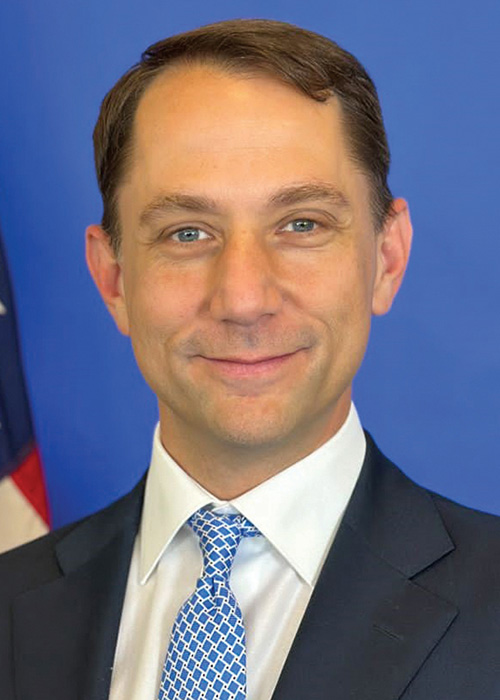
David Burnstein.
When Russia invaded neighboring Ukraine in February 2022, many ordinary Russians defied their government and took to the streets in protest. Russian authorities detained thousands of citizens for expressing anti-war views, sentenced opposition figures to decades in prison, and trampled on fundamental freedoms and basic human rights. Standing up against Putin’s repression was a White House priority, and political officer Dave Burnstein led U.S. government efforts on the front lines of that effort in Moscow.
Week after week, Burnstein showed up at Russian courthouses, often serving as the U.S. government’s sole representative at court hearings for Russians who had been detained simply for expressing their opinions.
The stakes were enormous. Russian journalists accosted Burnstein, authorities tried to intimidate him, and the security services published his photo online. But he was not deterred and eventually became a fixture at the proceedings. Some colleagues from other missions called him the “dean of the diplomatic corps” at the courthouse for helping attract and inspire the attendance of dozens of diplomatic colleagues from other countries.
Burnstein’s bold and effective efforts were the U.S. government’s most tangible demonstration of support for U.S. values amid Putin’s brutal crackdown. In one of the most hostile and challenging environments worldwide, amid an unprecedented deterioration in bilateral relations, Burnstein worked tirelessly in support of U.S. policies focused on advancing democracy, freedom, and governance.
“It was a privilege to be part of U.S. Embassy Moscow’s advocacy for human rights and democratic principles in Russia during a very challenging period in our relations,” said Burnstein. “The democracy and anti-war activists whose trials I attended should never have been arrested. They are being prosecuted for daring to have and express opinions that are different from the Kremlin’s, and their resilience is inspiring.”
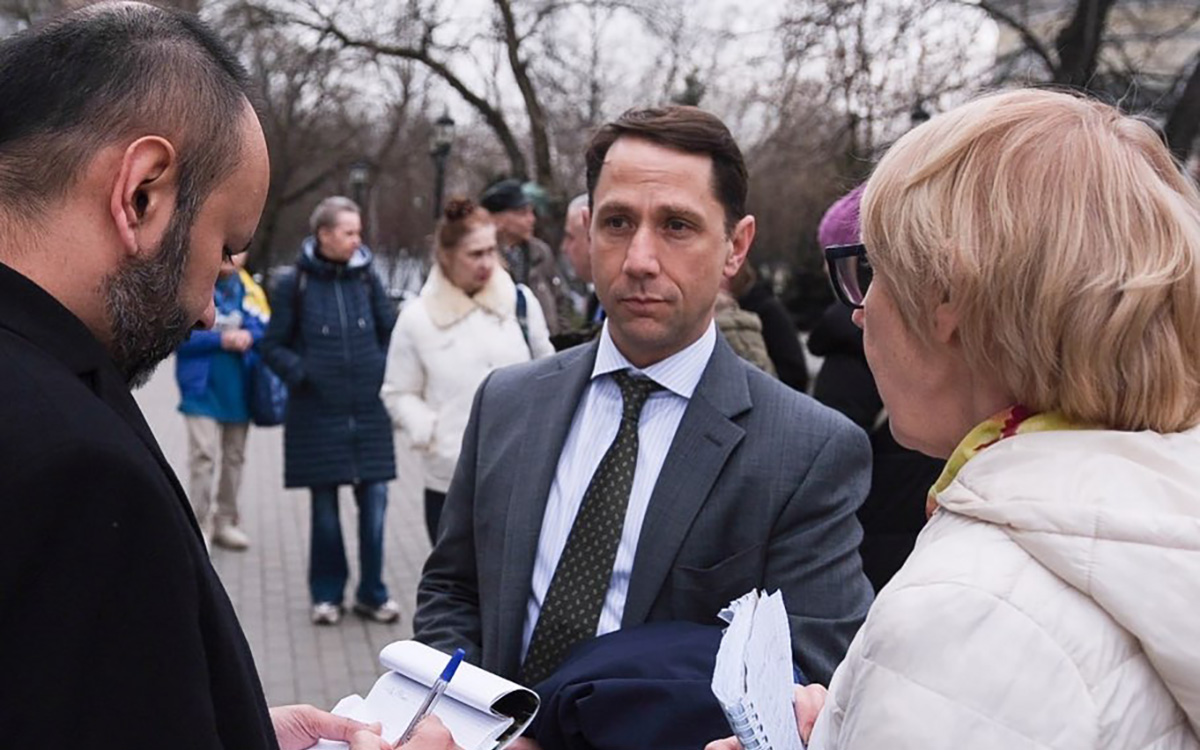
David Burnstein speaks to reporters outside a Moscow courtroom in April 2023.
When Russian authorities arrested Russian opposition leader and longtime embassy contact Vladimir Kara-Murza for expressing anti-war views, Burnstein led efforts within the embassy and international community to demonstrate to Putin that the world was watching. He rallied 40 foreign diplomats from 25 countries to attend hearings on the case and spent time with the activist’s family and lawyers, demonstrating U.S. leadership in support of human rights.
When prosecutors piled on new charges that included high treason, Burnstein pressed the State Department to include Kara-Murza in a new campaign to free political prisoners worldwide, collaborating with the public affairs team to amplify the campaign. When the court imposed a 25-year sentence, Burnstein served as the site officer at the courthouse where Ambassador Lynne Tracy publicly condemned the court’s decision, an act that garnered international media attention and ensured Russia’s crackdown on democracy drew the spotlight it deserved.
“Supporters of political prisoners say that a major fear of those in detention is that they have been forgotten—out of sight and out of mind,” said Burnstein. “But they are not forgotten, and the United States continues to call attention to those cases and work for their release.”
Since joining the Foreign Service in 2012, Dave Burnstein has served in Kazakhstan, Afghanistan, Azerbaijan, Russia, and Washington, D.C. He was a political officer at U.S. Embassy Moscow from August 2021 until September 2023, when he was declared persona non grata by the Russian government and given seven days to leave the country. A native of Louisville, Kentucky, Burnstein served as a U.S. Army officer and worked as an attorney prior to joining the State Department.
M. Juanita Guess Award for a Community Liaison Office Coordinator
Erin Cederlind: Morale Building and Evacuation Support
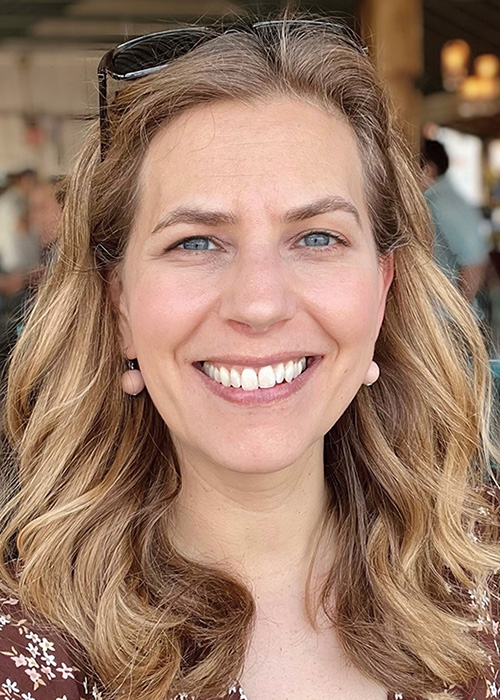
Erin Cederlind.
When Erin Cederlind arrived in post-pandemic Djibouti, she immediately threw herself into the event planning that is essential to the job of a community liaison office coordinator (CLO), starting with a Halloween Trunk-or-Treat party and moving on to events for all segments of the embassy population, including adults, children, singles, and couples. There wasn’t much of a blueprint for her and her co-CLO to work with, as events at the embassy had been put on hold while COVID-19 spread across the globe.
“In the aftermath of the pandemic, many posts around the world had lost the connections and traditions they’d worked hard to create over the years,” said Cederlind. “Djibouti was no different—so when I started as CLO, there was a lot of rebuilding to be done. But with each task came an opportunity to consider the best approach and try new ideas.”
Cederlind began creating fun, low-to-no-cost events for the community, partnering with the Regional Security Office and others to develop brown bag informational lunches; editing Djibouti’s first “Post Info to Go” video; participating in diversity, equity, inclusion, and accessibility events; refreshing contacts with local guides and vendors that had been lost during the pandemic; and serving on family member appointment (FMA) interview panels.
Her workload changed suddenly when nearby Sudan went on ordered departure, and Djibouti was told to prepare for an influx of evacuees from Khartoum. Cederlind worked dozens of hours of overtime as she canvassed the embassy community for clothing, toiletries, pet supplies (a real rarity in Djibouti), baby supplies, and other essential and comfort items.
Her workload changed suddenly when nearby Sudan went on ordered departure, and Djibouti was told to prepare for an influx of evacuees from Khartoum.
When the military rescue effort began to evacuate people from Khartoum, Cederlind reported for work at 3 a.m. to await the evacuees at nearby Camp Lemonnier. When more than 80 U.S. diplomats and their family members—including several pets and young children—arrived in Djibouti en route to Germany, they found everything they needed to relax and de-stress during these first moments of safety before continuing their onward travel later that day.
“Years ago, my husband and I left Libya just a few months before the embassy was evacuated,” said Cederlind. “As the situation there worsened, we followed the news of what was happening, and being unable to help was a terrible feeling. When our embassy became part of the planning to evacuate Khartoum, I was very glad to be able to help this time around. I hope I brought a measure of comfort to those who came through Djibouti.”
Cederlind’s tireless efforts and close coordination with the Moral, Welfare, and Recreation; Veterinary; and Red Cross offices at Camp Lemonnier were a key component of the embassy’s success in dealing with the larger Sudan crisis. After the initial group of evacuees left Djibouti for safe haven in the United States, she continued to gather and deliver supplies for fresh waves of American citizen evacuees who stopped over in Djibouti, even coming to the embassy late at night to load her car with donations. Once all evacuees had been cared for, Cederlind arranged a final event to offer local staff an opportunity to receive any remaining donations.
Erin Cederlind grew up in Nebraska and studied music at Gustavus Adolphus College in Minnesota. While there, she met her husband, Jonathan Poole. He joined the Diplomatic Security Service in 2003, the same year the couple were married. They and their two sons have since been posted in San Francisco, St. Petersburg, Tripoli, USUN New York City, Helsinki, and Washington, D.C. Cederlind has brought her love of music with her as they’ve traveled, participating in any performance opportunities she can find at post, joining orchestras and choirs, playing piano for receptions, or singing the national anthem for Independence Day events.
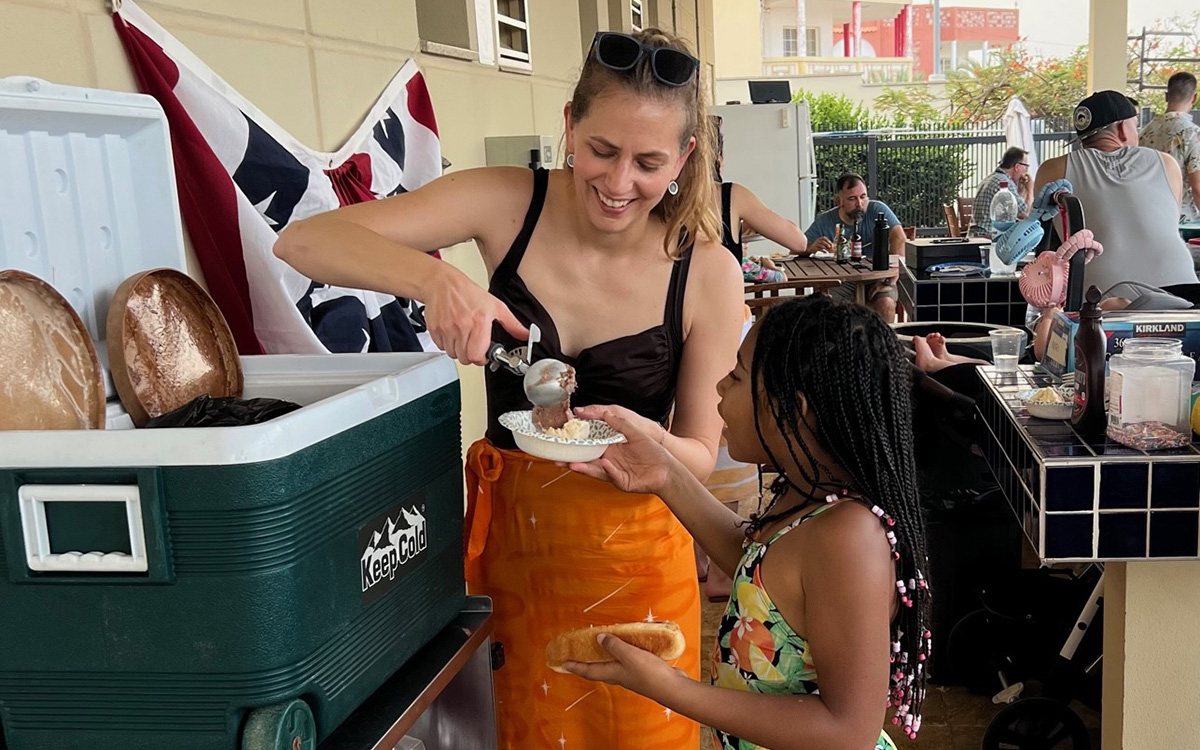
Erin Cederlind serving ice cream at a poolside event.
Avis Bohlen Award for a Foreign Service Family Member Honorable Mention
David Baugh: Creating Community After Ordered Departure
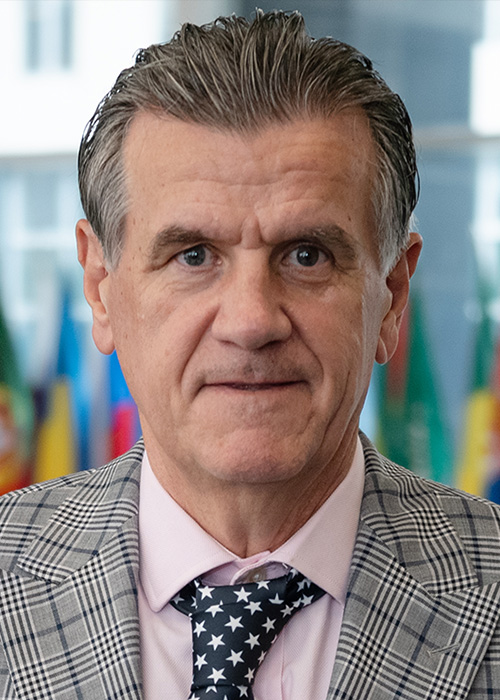
David Baugh.
With a deteriorating economic outlook and an ongoing civil war, Addis Ababa can be a tough place to live. After the embassy went through an ordered departure of more than 300 staff and family members in November 2021, its three-person Community Liaison Office was reduced to zero, leaving the remaining employees in desperate need of morale boosting.
Retired British diplomat and U.S. Foreign Service family member David Baugh arrived at post in February 2022 and took on the challenge of rebuilding morale in the bi-mission community (U.S. Embassy Addis Ababa and the U.S. Mission to the African Union), offering a continuous stream of social events. He organized pub quiz nights and events at the Marine House, intentionally bringing different groups in the community together. He coordinated the restoration of the outdoor pizza oven on the compound and advocated for upgrading the premises. He worked with the Diversity, Equity, Inclusion, and Accessibility Council to host the post’s first-ever representational PRIDE event—no easy feat in a country where homosexuality is illegal. He led the Marine Ball committee in planning the first ball since COVID-19. He worked with the post facilities and the American commissary to resurface degrading tennis courts.

David Baugh, shown here with May Salameh Jones, played a pivotal role in organizing embassy events, including this celebration on May 4, 2022.
Even after the CLO was fully staffed, Baugh continued to volunteer, co-hosting a Halloween event, the Regional Security Office’s community preparedness day, Thanksgiving, a winter holiday party, Take Your Child to Work day, and a thank-you event for embassy social sponsors.
He played a pivotal role in organizing post’s first post-pandemic Independence Day event in 2022, an event for 400 guests planned and executed within six weeks. The following year, Baugh encouraged the embassy to plan an even bigger bash, and the embassy welcomed almost 1,000 guests to an early Independence Day celebration. Baugh set post records in fundraising and acquiring in-kind donations for the event.
During a Spring Celebration event at the embassy, with more than 300 in attendance, including 150 children, Baugh was on the sidelines at the start of a sack race. Noticing a 3-year-old falling behind, he picked the boy up and helped him across the finish line. That act, though small, exemplifies his true character and symbolized all he has done for the 1,500-person bi-mission in Addis Ababa.
David Baugh is a 37-year veteran of the British Diplomatic Service, having served overseas in Lisbon, Ashgabat, Dushanbe, Port of Spain, Belmopan, Kabul, and Pristina. Baugh met his wife, Ambassador Tracey Jacobson, in Ashgabat, and the couple managed to mostly serve together before retiring (for the first time) in 2017. When his wife was recalled to duty as chief of mission in Addis Ababa, he embraced the opportunity to put his management and planning skills to good use both for official entertaining at the chief-of-mission residence and for community-building events.
AFSA Post Representatives of the Year
Felix Peng and Paige Puntso: Supporting AFSA Members in China
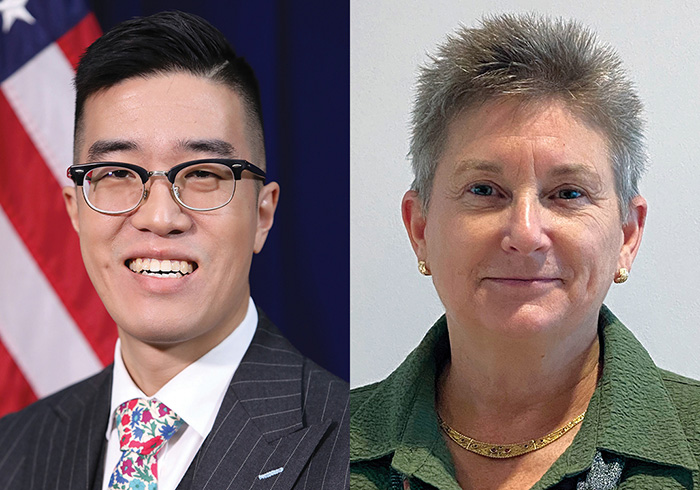
Felix Peng and Paige Puntso.
Felix Peng and Paige Puntso are being jointly recognized for their work as AFSA post representatives in Beijing. Together they organized numerous AFSA information tables during embassy events, maintained a regular AFSA Corner in the post newsletter, and served as advocates for member concerns. They advocated directly for issues such as pay errors and technology allowances, and kept AFSA informed about member concerns in the difficult period during China’s “zero COVID” policy.
Felix Peng joined the State Department as an economic officer in 2020, and Beijing was his first post. He is currently assigned to Bogotá.
Paige Puntso joined the Foreign Service as a consular officer in 2014 after retiring from the U.S. Army. She has served in Ciudad Juárez, Guangzhou, and Beijing. She is currently the AFSA representative and chief of American Citizen Services in Dhahran.
AFSA Achievement and Contributions to the Association Award
Ken Kero-Mentz: Defending the Diplomats Defending Our Country
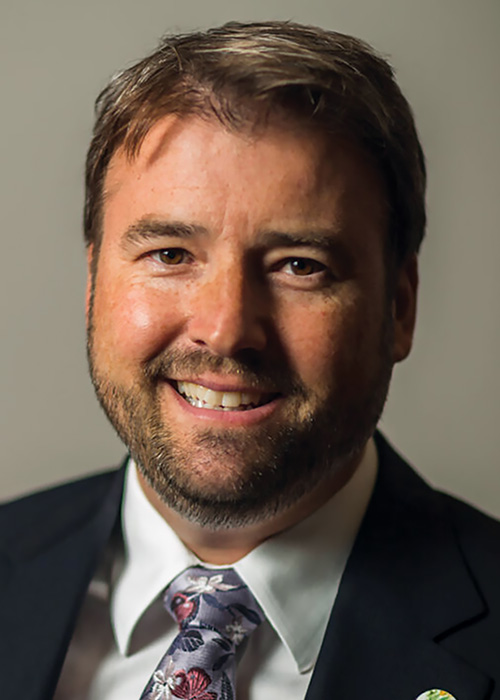
Ken Kero-Mentz.
During a decade and a half of active engagement with AFSA, Ken Kero-Mentz made significant contributions to the association both in its role as the professional association for U.S. career diplomats and as the labor union representing Foreign Service members.
“I’ve always believed in trying to make the State Department the best place to work for everyone, and especially those of us in the Foreign Service, where ‘work’ is a 24/7 kind of thing,” said Kero-Mentz. “AFSA has been the best place to bring my energy, enthusiasm, and ideas to fruit. We are so fortunate to have AFSA on our side.”
Between 2006 and 2009, Kero-Mentz served as a volunteer AFSA post representative at U.S. Embassy Berlin, assisting members with questions and guiding them to find appropriate resources within the department or within AFSA. He also advocated for his colleagues in discussions with post management. AFSA recognized his efforts by naming him AFSA Post Rep of the Year in 2009.
Between 2011 and 2015, Kero-Mentz served two terms as an elected State representative on the AFSA Governing Board. He served on several AFSA committees and represented AFSA in meetings on Capitol Hill and with State Department leadership as well as in discussions with journalists and outside organizations. “It gave me tremendous insight into the inner workings of AFSA, the professional association, and AFSA, the union,”
Kero-Mentz told the FSJ. “I also saw how AFSA can work in partnership with the various employee organizations, like glifaa, Working in Tandem, Balancing Act, and others, to further our joint goals of making the State Department the best place to work in Washington and around the world.” Kero-Mentz then served as AFSA State vice president from 2017 to 2019, acting as lead negotiator for AFSA’s largest constituency and overseeing AFSA’s 10-member Labor Management staff of attorneys and counselors. Serving during the chaotic first two years of the Trump administration, Kero-Mentz fought to protect Foreign Service (FS) members, fought against proposals to slash the size of the Foreign Service, and worked to maintain employee benefits.
We are so fortunate to have AFSA on our side.
–Ken Kero-Mentz
He helped convince the State Department to improve its treatment of FS families with special needs children and helped secure additional treatment and assistance for employees suffering from unexplained health incidents in Cuba and China. He negotiated the first new union-management Framework Agreement with the State Department since 1987. He served on the Governing Board committee that proposed substantial revisions to the AFSA Bylaws, which the AFSA membership overwhelmingly approved. He remembers fondly working so closely with a devoted team of AFSA employees, noting that “across the board, our members should know how fortunate we are to have folks at AFSA working every day to further AFSA’s goals—which of course are your goals.”
From 2019 to 2021, Kero-Mentz served as the AFSA secretary on the Governing Board. During these tense final two years of the Trump administration and the start of the COVID-19 pandemic, he chaired the AFSA Legal Defense Fund Committee as it rose to the historic occasion of assisting the dozen AFSA members called to testify during the 2019 Trump impeachment hearings. The fund raised more than $750,000 in three months and paid $468,000 in attorney fees to save FS colleagues from the severe financial hardship they would have suffered if they had had to pay for their own representation. He worked with other Governing Board members to reform AFSA internal personnel policies to enhance family and medical leave benefits for AFSA staff.
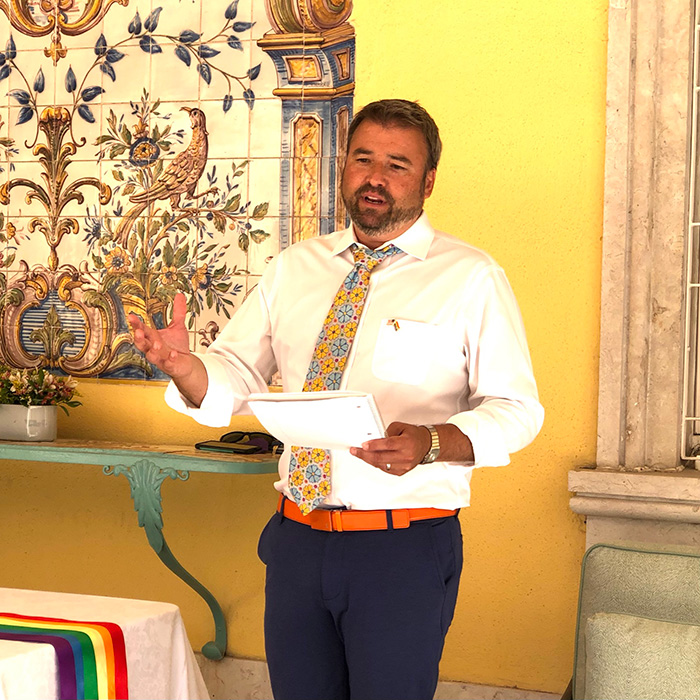
Ken Kero-Mentz delivering remarks at U.S. Embassy Lisbon’s Pride Reception in 2021.
Greg Kubiak
Kero-Mentz joined the State Department in 2000 and served overseas in Rio de Janeiro, Baghdad, Berlin, Colombo, and Erbil; worked domestically in the Bureaus of European and Eurasian Affairs and Democracy, Human Rights, and Labor; and as an assessor for the Board of Examiners. He was a frequent board member of glifaa (Gays and Lesbians in the Foreign Affairs Agencies), serving as its president from 2012 to 2013.
An economic officer, Kero-Mentz twice won the Superior Honor Award, for his work on arms control in Berlin (2009) and as chief of the 16-person political and economic section in Erbil (2016). Prior to joining State, he spent five years on Capitol Hill covering a wide range of legislative issues, from environment and trade to education and foreign policy.
Raised in Vermont, Kero-Mentz earned a B.A. in international affairs and a master’s degree in public administration from The George Washington University in Washington, D.C. He speaks German and Portuguese. He retired from the Foreign Service in 2020 but continues to serve the department as a reemployed annuitant.
Ken Kero-Mentz and his husband, Neil, are currently in the process of obtaining residency and purchasing an apartment in northern Portugal, where they plan to live. “In many ways, my time in the Foreign Service brought me to where I am today,” Kero-Mentz told the FSJ. “I learned Portuguese at FSI before serving in Brazil, and I took advantage of retirement shortly after hitting 50, opting to follow a different path than the high-stakes work/life of international diplomacy. I wouldn’t be able to live the life I’m living had it not been for the Foreign Service, and I know just how fortunate I am.”
When sharing or linking to FSJ articles online, which we welcome and encourage, please be sure to cite the magazine (The Foreign Service Journal) and the month and year of publication. Please check the permissions page for further details.


